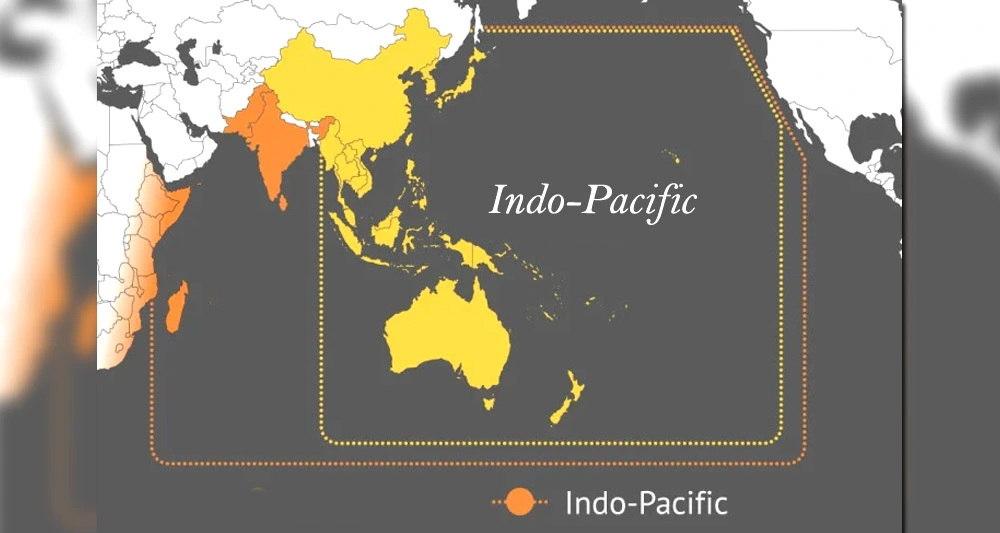Indo Pacific Region
The Indo-Pacific region is a vast geographic area that encompasses the Indian Ocean and the western and central Pacific Ocean. It includes the countries and territories that border these bodies of water, such as India, China, Japan, Australia, Indonesia, and the United States.
The term “Indo-Pacific” has gained increasing usage in recent years as a way of describing the interconnectedness of the Indian and Pacific Oceans and the countries and economies that are linked by them. It highlights the strategic importance of the region as a key driver of global trade, investment, and security.
The Indo-Pacific region is home to some of the world’s largest and most populous countries, including China and India. It also includes many smaller island nations, such as Fiji, the Maldives, and Papua New Guinea. The region is characterized by a rich diversity of cultures, languages, and religions, and it has a long history of economic and political interactions.
In recent years, there has been growing attention on the Indo-Pacific region as a key arena of strategic competition between major powers, particularly China and the United States. Many countries in the region are also grappling with a range of challenges, including geopolitical tensions, environmental degradation, and economic inequality.
Which are the Indo Pacific countries
The term “Indo-Pacific” refers to a geographic region that encompasses the Indian Ocean and the western and central Pacific Ocean, including their surrounding nations and islands. The following countries are generally considered to be part of the Indo-Pacific region:
- Australia
- Bangladesh
- Brunei
- Cambodia
- China
- Fiji
- India
- Indonesia
- Japan
- Kiribati
- Laos
- Malaysia
- Maldives
- Marshall Islands
- Micronesia
- Myanmar (Burma)
- Nauru
- New Zealand
- North Korea
- Palau
- Papua New Guinea
- Philippines
- Samoa
- Singapore
- Solomon Islands
- South Korea
- Sri Lanka
- Taiwan
- Thailand
- Timor-Leste (East Timor)
- Tonga
- Tuvalu
- Vanuatu
- Vietnam
Why India is important in Indo Pacific
India is important in the Indo-Pacific region for several reasons:
- Geostrategic location: India’s location at the center of the Indian Ocean gives it a critical position in the Indo-Pacific region. The Indian Ocean is the world’s third-largest body of water and connects Asia, Africa, the Middle East, and Australia. India’s location makes it a gateway to these regions, providing it with strategic importance.
- Economic potential: India is the world’s sixth-largest economy and has the potential to become a significant economic power in the Indo-Pacific region. The country has a large and growing consumer market, a young workforce, and a thriving technology sector. India’s economic growth can help drive the region’s economic development and prosperity.
- Military capabilities: India is one of the largest and most powerful military forces in the region. It has a strong navy and air force, and it is strategically located near key sea lanes and chokepoints in the Indian Ocean. India’s military capabilities are essential for maintaining regional security and stability.
- Democracy: India is the world’s largest democracy and shares values such as free speech, human rights, and the rule of law with other democracies in the Indo-Pacific region. India’s democratic values make it a natural partner for other democracies in the region, such as the United States, Japan, and Australia.
- Soft power: India has a rich cultural heritage and a diverse population, which gives it significant soft power in the Indo-Pacific region. Indian culture, including music, movies, and cuisine, is popular across the region. India’s soft power can help build stronger relationships with other countries in the region.
India’s strategic location, economic potential, military capabilities, democratic values, and soft power make it an important player in the Indo-Pacific region. As the region becomes increasingly important in global affairs, India’s role is likely to grow in significance.
7 pillars of indo pacific
The concept of the “Indo-Pacific” refers to a region that encompasses both the Indian Ocean and the western and central Pacific Ocean, and has gained increasing importance in recent years as a strategic and economic space. While there is no single agreed-upon set of pillars that define the Indo-Pacific, here are seven common themes that are often associated with the concept:
- Geopolitical importance: The Indo-Pacific is seen as a crucial region in terms of global geopolitical dynamics, with key powers such as the United States, China, Japan, India, and Australia all having important interests and roles to play in the region.
- Maritime security: Given the vast expanse of ocean that the Indo-Pacific encompasses, ensuring maritime security is a key concern. This includes issues such as freedom of navigation, combating piracy and terrorism, and preventing territorial disputes from escalating into conflict.
- Economic integration: The Indo-Pacific is a region of significant economic activity, with many countries increasingly integrated through trade and investment flows. Initiatives such as the Belt and Road Initiative (BRI) and the Trans-Pacific Partnership (TPP) have sought to further deepen economic ties in the region.
- Connectivity: In addition to economic integration, there is a growing focus on physical connectivity in the Indo-Pacific, particularly in terms of transportation infrastructure such as ports, highways, and railways.
- Environmental sustainability: The Indo-Pacific region is home to a wide variety of ecosystems and biodiversity, but also faces significant environmental challenges such as climate change, marine pollution, and overfishing. Addressing these issues is seen as a key priority.
- Cultural exchange: The Indo-Pacific is a region of rich cultural diversity, with many different languages, religions, and traditions represented. Encouraging cultural exchange and understanding is seen as a way to build greater regional cooperation and harmony.
- People-to-people ties: Finally, building stronger people-to-people ties between countries in the Indo-Pacific is seen as an important way to deepen mutual understanding and trust, and foster greater regional integration and cooperation.
Indo Pacific economic framework
The Indo-Pacific Economic Framework refers to a concept and proposed strategy for economic cooperation and integration in the Indo-Pacific region. The region spans from the eastern coast of Africa to the western coast of the Americas, encompassing the Indian Ocean and the Pacific Ocean. The concept was introduced in 2017 by Japanese Prime Minister Shinzo Abe, and has since gained support from other countries such as the United States, Australia, and India.
The framework is based on the principles of free and open trade, investment, and connectivity, and seeks to promote economic growth and development in the region. It aims to strengthen regional infrastructure, support innovation and entrepreneurship, enhance connectivity and digitalization, and promote sustainable development.
The Indo-Pacific Economic Framework is seen as a counterbalance to China’s Belt and Road Initiative (BRI), which has been criticized by some countries for its lack of transparency, debt-trap diplomacy, and strategic aims. However, proponents of the Indo-Pacific concept stress that it is not intended to be a rival to the BRI, but rather a complementary framework that upholds international norms and standards.
The framework has yet to be fully realized, and its implementation faces challenges such as differing priorities and interests among participating countries, geopolitical tensions, and the impact of the COVID-19 pandemic. However, it remains a key concept in discussions of regional economic cooperation and integration in the Indo-Pacific.
Benefits of indo pacific
Here are some of the benefits of the Indo-Pacific:
- Economic Growth: The Indo-Pacific region is home to some of the world’s fastest-growing economies, including China, India, and ASEAN countries. The region accounts for nearly two-thirds of the world’s population, and the growing middle class is driving demand for goods and services.
- Trade and Investment: The Indo-Pacific region is a critical hub of global trade and investment, with major seaports, shipping lanes, and trade routes connecting East and West. The region is a significant producer and consumer of goods and services, and its economic integration is essential for global economic growth.
- Strategic Importance: The Indo-Pacific is a vital strategic region for global security and stability. The region hosts major military powers such as the United States, China, India, and Japan. The region also faces significant security challenges such as piracy, terrorism, and territorial disputes.
- Environmental Resources: The Indo-Pacific region contains some of the world’s most significant and diverse marine ecosystems, including coral reefs, mangroves, and seagrass beds. These ecosystems provide critical resources such as fish, minerals, and energy. The region’s biodiversity is also essential for scientific research and development.
- Cultural Diversity: The Indo-Pacific region is home to a vast array of cultures and traditions, reflecting the rich history and diversity of the region. This diversity is a source of strength and resilience, and it is essential for promoting mutual understanding and cooperation among nations.
Indo Pacific Strategy
The Indo-Pacific Strategy refers to a geopolitical concept and framework that has gained popularity in recent years, particularly in the context of the United States’ foreign policy.
It refers to the region encompassing the Indian Ocean and the western and central Pacific Ocean, including the countries that border them, such as India, China, Japan, Australia, and the ASEAN (Association of Southeast Asian Nations) member states.
The Indo-Pacific Strategy aims to promote stability, security, and prosperity in the region, while also countering the rising influence of China. It involves a variety of diplomatic, economic, and military initiatives, such as expanding trade relationships, strengthening military alliances, and increasing security cooperation with regional partners.
In essence, the Indo-Pacific Strategy is an attempt by the United States to assert its presence and influence in a region that is becoming increasingly important both economically and strategically, and to counterbalance the growing power of China in the region.
Importance of Indo Pacific
Here are some of the key reasons why the Indo-Pacific is important:
- Economic importance: The Indo-Pacific is home to some of the world’s fastest-growing economies and is expected to be the driver of global economic growth in the coming decades. The region accounts for more than half of the world’s population and a significant portion of global trade and investment.
- Strategic importance: The Indo-Pacific is also strategically important because it is home to several major powers, including China, India, Japan, and the United States. The region’s strategic location also makes it a key transit point for global shipping and energy supplies.
- Security challenges: The Indo-Pacific faces a number of security challenges, including territorial disputes, terrorism, piracy, and nuclear proliferation. These challenges have the potential to destabilize the region and have global implications.
- Environmental challenges: The Indo-Pacific is home to some of the world’s most diverse and fragile ecosystems, including coral reefs, mangroves, and rainforests. The region is also vulnerable to climate change, which could have devastating effects on the region’s environment and economies.
- Cultural diversity: The Indo-Pacific is home to a rich and diverse array of cultures, religions, and languages. The region’s cultural heritage is an important part of its identity and contributes to its social and economic vibrancy.
The Indo-Pacific is an important region that plays a vital role in shaping the global economy, security, and environment. As such, it is important for countries in the region and beyond to work together to promote peace, stability, and sustainable development in the region.

























+ There are no comments
Add yours